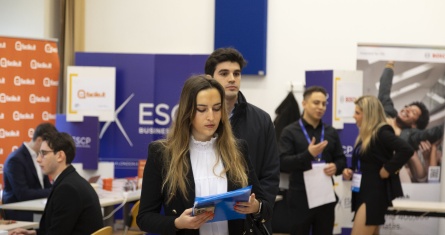In today's rapidly evolving business landscape, organisations encounter unique challenges and opportunities driven by technological advancements. We are excited to announce a strategic corporate partnership between the ESCP Business School Turin Campus and KPMG, a global leader in professional services. KPMG is a future-focused organisation, with an emphasis on agility and connectivity, and invests in technology and talent to deliver trusted advice and innovative solutions. The firm provides clients with tailored advisory services that address emerging market trends and strives to make a positive difference for its people, clients and society.
We interviewed Marco Perrone, Partner at KPMG, to celebrate this new partnership.
How is KPMG driving innovation globally?
KPMG is at the forefront of driving innovation by investing heavily in emerging technologies, including artificial intelligence, data analytics, blockchain, and quantum computing, to ensure our clients are future-ready. We believe that the most transformative advancements come from collaboration, which is why we embrace open innovation, connecting with a global ecosystem. We are building an innovation ecosystem with technology partners such as SAP, Microsoft, Oracle, Salesforce, among others, as well as with universities and startups, academia, and research institutions. This collaborative approach helps us stay ahead of market trends, delivering state-of-the-art advisory services to clients.
To support our innovation journey, we have established global innovation hubs and formed strategic alliances with leading technology firms. This enables us to bring cutting-edge solutions to a range of industries, including consumer goods, automotive, and financial services.
Among our many initiatives are two flagship programmes. KPMG Ignition brings together cross-disciplinary teams of data scientists, designers, and technologists to address complex client challenges through digital transformation. Meanwhile, KPMG Lighthouse, our global centre of excellence for data-driven technologies, unites specialists in AI, data science, and automation to deliver innovative solutions that enhance decision-making.
Whether through comprehensive business transformations or advanced technological solutions, KPMG is helping to create smarter, more agile organisations worldwide. Innovation is not just part of our strategy; it is at the core of everything we do.
In your opinion, what are the key skills that employees will need to develop to thrive in an AI-enabled workplace?
To succeed in an AI-enabled workplace, employees must develop a combination of technical and soft skills that blend human creativity with machine intelligence. At KPMG, we see AI as a tool for augmentation rather than automation - one that complements rather than replaces human capabilities. Our approach is centred on using technology to enhance human potential, ensuring no one is left behind as we advance.
On the technical side, foundational knowledge of AI, data interpretation, algorithmic thinking, and an understanding of how AI systems operate will be essential for informed decision-making. However, soft skills are equally crucial in this landscape. Problem-solving, critical thinking, emotional intelligence, and collaboration will play key roles in navigating the opportunities and challenges that AI brings.
Our KPMG Future of Work Report highlights employee perspectives on these emerging demands amid AI advancements, economic uncertainty, and geopolitical shifts. Based on insights from over 4,000 employees across different generations, the report shows that 62% of employees say an organisation's commitment to upskilling influences their decision to join, stay, or leave. Yet, only 56% feel their companies actively invest in these areas.
The future will require organisations to offer real-time access to new skills, enhancing both adaptability and competitiveness. Companies must harness AI's potential, strategically reshape their workforce, and provide continuous upskilling opportunities embedded within daily work to achieve this.

In the context of emerging technologies and their impact on job roles, how do you see the role of leaders evolving as they integrate emerging technologies to foster human-machine collaboration?
The role of leaders is evolving from being traditional decision-makers to becoming orchestrators of human-machine collaboration. It's no longer just about adopting new technologies; leaders must foster a culture that embraces innovation and agility. Visionary leaders will guide teams through change, instilling trust in new technologies, championing ethical AI use, and investing in upskilling to ensure employees can thrive alongside AI.
Leaders will need to be fearless in embracing this human-machine era, serving as ambassadors of change and ensuring all employees feel part of the journey. This includes not only preparing the workforce with the right skills but also building a culture open to collaboration between human and artificial intelligence.
According to our KPMG Global CEO Outlook 2024, which surveyed over 1,300 global CEOs, technological innovation has been the most disruptive force in the past decade. Today, 64% of CEOs indicate they will continue to invest in AI regardless of economic conditions, recognising its potential to transform every aspect of business and daily life. Despite public concerns about job redundancies, 76% of CEOs believe AI will not significantly reduce jobs within their organisations over the next three years. However, only 38% feel their workforce currently possesses the skills to fully leverage AI, and 58% note that generative AI is prompting a rethink of skills needed for entry-level roles.
While we are encouraged that CEOs are prioritising AI and innovation, this push for adoption must be done ethically and with genuine transformative intent. AI can add immense value across all business areas, but for this potential to be realised, organisations must invest in upskilling and change management, ensuring all employees can engage proactively with these technologies. With the right focus on skill development, leaders can position their organisations to foster sustainable growth and lead a successful integration of human-machine collaboration in the workplace.
What advice would you give students aspiring to build a career in a global firm like KPMG?
Here is my personal advice for young talents who want to thrive in a global company like KPMG. I have six key suggestions that can help set you on the right path:
- Be Curious and Open-Minded: The business landscape is constantly changing, and staying curious about industries, companies, and global trends is essential. A curious mindset sets a strong foundation, helping you understand not only how the industry works but also the specific ways companies tackle emerging risks, trends, and challenges.
- Be Adaptable and Resilient: In consulting, adaptability and resilience are vital in today's fast-paced environment. Challenges and changes come quickly, so your ability to adjust and persist will play a significant role in your success.
- Embrace Collaboration: At KPMG, teamwork is a core value. Success here is built on "we do" rather than "I do." Being a team player and working collaboratively with others will set you on the right path.
- Be Assertive and Think Critically: Assertiveness and critical thinking are invaluable skills in a global organisation. Assertiveness helps you communicate with clarity and respect, while critical thinking allows you to make well-informed decisions. Forming your own, evidence-based viewpoints rather than relying on second-hand opinions will strengthen your contributions and enhance your credibility within a team.
- Prioritise Ethics and Integrity: Consulting requires a strong ethical foundation. Familiarise yourself with industry standards and maintain integrity in every action. Ethics should guide every decision, and this commitment will distinguish you as a trusted professional.
- Cultivate a Global Mindset: In a firm like KPMG, understanding different cultures and perspectives is essential. Be open to new experiences and consider opportunities to work with international teams or clients. A global mindset enables you to connect effectively with colleagues and clients around the world, an increasingly critical skill in our interconnected economy.
This blend of curiosity, adaptability, collaboration, ethical focus, and a global perspective will greatly benefit your career. Remember, success in a global firm goes beyond technical skills; it demands a commitment to learning, ethical leadership, and the ability to work effectively across cultures.
At KPMG, we are dedicated to cultivating a culture that values ethics over quick wins, understanding that sustainable growth stems from principled actions.
KPMG has recently partnered with ESCP Business School. What were the key factors that influenced the firm's strategic decision to partner with ESCP? How do you see this partnership contributing to the firm's overall objectives?
KPMG's decision to partner with ESCP Business School was guided by several strategic factors. ESCP is internationally recognised for its global reach, academic excellence, and strong emphasis on innovation and entrepreneurship - qualities that align closely with KPMG's objective of cultivating leadership within an increasingly interconnected world.
This partnership offers KPMG access to a remarkable talent pool, allowing us to engage with some of the brightest minds and support the development of future leaders. Our leadership is strongly committed to creating a work environment that allows everyone to express themselves fully, unlocking their potential. By working closely with ESCP, we aim to offer students unique opportunities to immerse themselves in real-world challenges and join career paths within KPMG that are structured for growth, learning, and meaningful impact.
At KPMG, we deeply value investment in the next generation, and this collaboration with ESCP is a proud step forward in that commitment. We believe this partnership will be a lasting one, fostering talent with the right mindset and skills to meet the evolving demands of the global business landscape.
One key characteristic of ESCP Turin Campus is its strong ties with the business community. The campus boasts 19 corporate partners and robust relationships with several national and international companies.
Find out more about our Corporate Partners.
Campus


